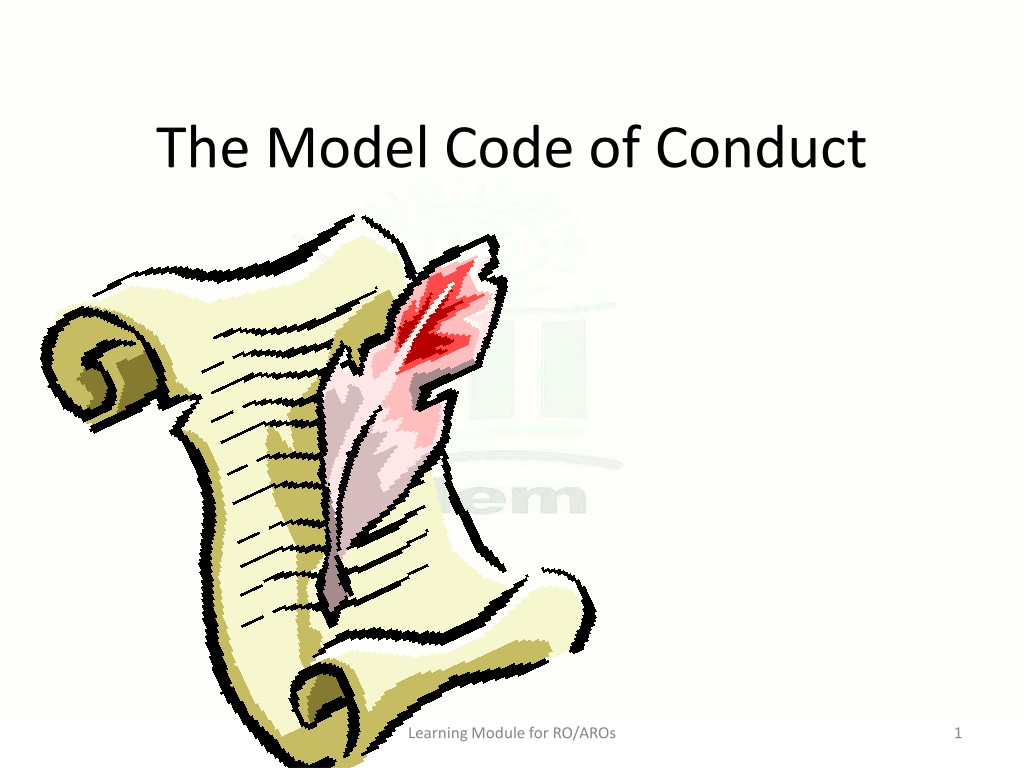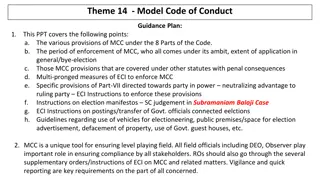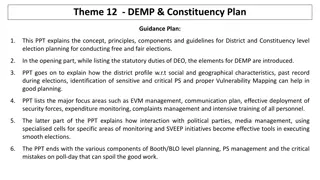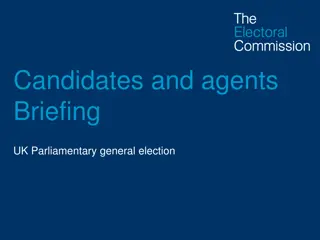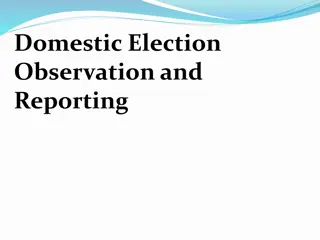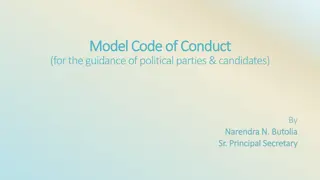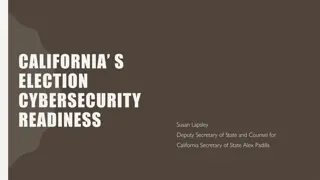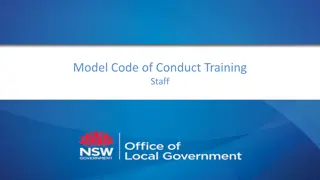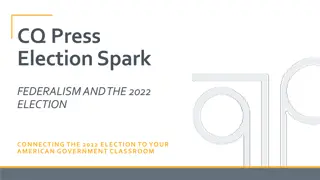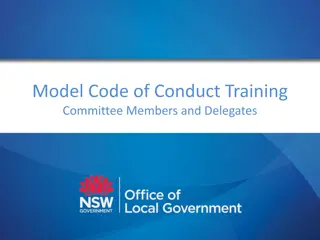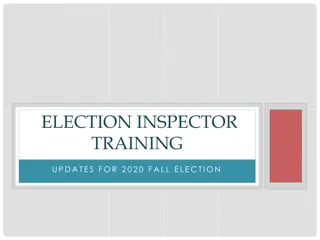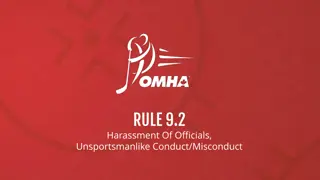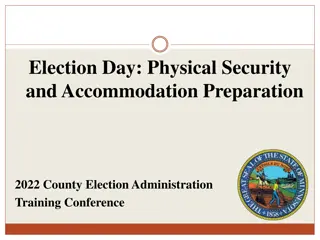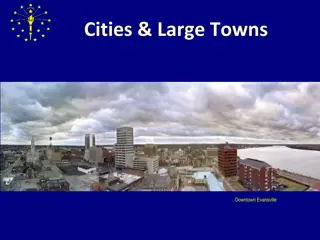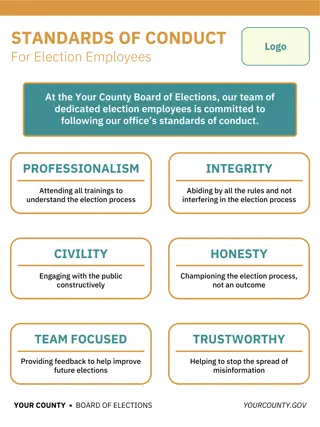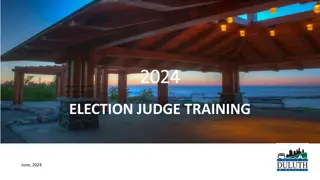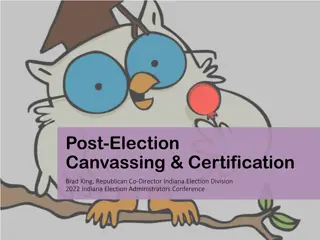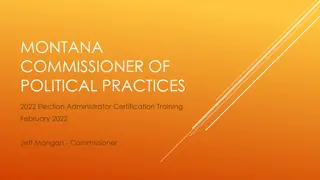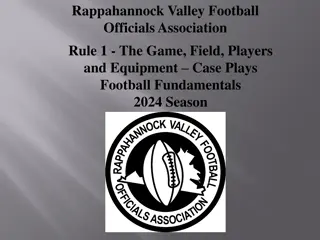Understanding the Model Code of Conduct for Election Officials
Explore the Model Code of Conduct (MCC) designed for election officials, covering its objectives, importance, application, dos & don'ts, and the ban on transfer of officials during the electoral process.
Download Presentation

Please find below an Image/Link to download the presentation.
The content on the website is provided AS IS for your information and personal use only. It may not be sold, licensed, or shared on other websites without obtaining consent from the author. Download presentation by click this link. If you encounter any issues during the download, it is possible that the publisher has removed the file from their server.
E N D
Presentation Transcript
The Model Code of Conduct Learning Module for RO/AROs 1
Model Code of Conduct (MCC) 4 3 1 2 Broad Areas of Application MCC applicable to officials Objective of MCC Why MCC 6 5 8 7 MCC for MCC & Ban on transfer of officials MCC - Dos & Don ts for Pol.Parties/candidat es MCC for political parties/candida tes Ministers/Chairmen /Members of Commissions 10 9 11 MCC for Use of Official Vehicles MCC for FAQ on MCC State/Central Govt Learning Module for RO/AROs 2
The material on MCC has been clubbed on the basis of users/decision-makers who are affected by the relevant provision of MCC
1: Objective of MCC MCC comes into operation from the day ECI announces the program for election in your constituency Developed for maintaining a healthy and peaceful atmosphere conducive to the conduct of smooth elections Learning Module for RO/AROs 4
2: Rationale behind MCC A visible and rigorous enforcement of Model Code of Conduct enhance the credibility of the elections and gives confidence to the stakeholders/voters. It ensures that official machinery for the electoral purposes is not misused. It ensures that electoral offences, malpractices and corrupt practices such as impersonation, bribing and inducement of voters, threat and intimidation to the voters, is prevented by all means. 5 Learning Module for RO/AROs
3: Broad areas of Application 1. Execution of welfare schemes and Government work. Publicity / campaign on welfare schemes and Government work. Appointment, transfer and posting of Government officials. Use of Rest House, Dak Bungalow and other Government accommodation. Provisions regarding tour of Ministers / Political functionaries. Use of official aircrafts/vehicles. Use of loudspeaker. Printing of pamphlet, posters & other media activities. 2. 3. 4. 5. 6. 7. 8. 6 Learning Module for RO/AROs
All subsequent slides are prepared in three different colors Green Blue Purple Green indicates pre-poll tasks/instructions Blue indicates poll-day task/instructions Purple indicates post-poll task/instructions 07-09-2024 Learning Module for RO/AROs 7
Model Code of Conduct (MCC) 4 MCC applicable to officials Learning Module for RO/AROs 8
4/1: Model Code of Conduct for Officials Any official who meets the Minister on his private visit to the constituency where elections are being held shall be guilty of misconduct under the relevant service rules; and if he happens to be an official mentioned in Section 129 (1) of the Representation of People Act, 1951, he shall also be additionally considered to have violated the statutory provisions of that Section and liable to penal action provided thereunder. 07-09-2024 Learning Module for RO/AROs 9
4/2: Model Code of Conduct for Officials No Official Video Conferencing should take place between the Ministers and Union of State Government and other Political functionaries after announcement of Election. (Instruction Sl. No.29 of compendium Vol.-3. ECI letter No.437/6/ 2004-PLN dt.30.12.2004)
4/3: Model Code of Conduct for Officials There are restrictions on tours / leave of the officers whose spouses are active in Political arena. In such cases, the concerned officers should not leave their HQs either on leave or on tour till the elections are complete (Instruction SL. No. 9, EC letter No.437/6/98-PLN-III dated 23.01.1998)
Model Code of Conduct (MCC) 5 MCC & Ban on transfer Learning Module for RO/AROs 12
5/1: Model Code of Conduct for Ban on Transfer There shall be a total ban on the transfer of all officers/officials connected with the conduct of the election. These include but are not restricted to The Chief Electoral Officer and Additional/Joint/Deputy Chief Electoral Officers; Divisional Commissioners; 07-09-2024 Learning Module for RO/AROs 13
5/2: Model Code of Conduct for Ban on Transfer The District Election Officers, Returning Officers, Assistant Returning Officers and other Revenue Officers connected with the Conduct of Elections; Officers of the Police Department connected with the management of elections like range IGs and DIGs, Senior Superintendents of Police and Superintendents of Police, Sub-divisional level Police Officers like Deputy Superintendents of Police and other Police officers who are deputed to the Commission under section 28A of the Representation of the People Act, 1951; 07-09-2024 Learning Module for RO/AROs 14
5/3: Model Code of Conduct for Ban on Transfer Other officers drafted for election works like sector and zonal officers, Transport cell, EVM cell, Poll material procurement & distribution cell, Training cell, Printing Cell etc. Senior officers, who have a role in the management of election in the State, are also covered by this direction. The transfer orders issued in respect of the above categories of officers prior to the date of announcement but not implemented till the time when model code came into effect should not be given effect to without obtaining specific permission from the Commission. 07-09-2024 Learning Module for RO/AROs 15
5/4: Model Code of Conduct for Ban on Transfer In those cases where transfer of an officer is considered necessary on account of administrative exigencies, the State Government may, with full justification, approach the Commission for prior clearance. No appointments or promotions in Government / Public Undertakings shall be made during this period, without prior clearance of the Commission. 07-09-2024 Learning Module for RO/AROs 16
5/5: Model Code of Conduct for Ban on Transfer Various instructions on transfer/posting of officers for conduct of free and fair elections. Officer should not be allowed to continue in the present district if officer is posted in her/his home district and completed three years out of four years in that district. Officers/officials against whom Commission has recommended disciplinary action or who have been charged for any lapse in any election or election related work or who were transferred under the orders of the Commission previously may not be assigned any election related duty(ies). The Commission further desires that no officer/official against whom a criminal case is pending in any court of law, be associated with the election work or election related duty. 07-09-2024 Learning Module for RO/AROs 17
5/6: Model Code of Conduct for Ban on Transfer Various instructions on transfer/posting of officers for conduct of free and fair elections. The transfer orders in respect of officers/officials who are engaged in the electoral rolls revision work shall be implemented only after final publication of electoral rolls. The copies of the transfer orders issued under these directions shall be given to the Chief Electoral Officers concerned without fail. Any officer who is due to retire within coming six months will be exempted from the purview of the above-mentioned directions of the Commission. All the officials of the States/UTs who are on extension of service or re-employed in different capacities will not be associated with any election related work except those with the Office of CEOs. Instruction SL. No. 81, Election Commission s letter No. 437/6/2006/PLN- III Dated : 06th November, 2006 07-09-2024 Learning Module for RO/AROs 18
Model Code of Conduct (MCC) 6 MCC for Ministers/Chairmen /Members of Commissions Learning Module for RO/AROs 19
6/1: Model Code of Conduct for Ministers/Chairmen/Member of Commission No minister either of central or state government shall undertake an official visit of any constituency from which elections have been announced by ECI till end of election process No minister will summon any election related officer of constituency or state in which any elections have been announced, to a place or office, or guest house outside the aforesaid constituency for any official discussion during the period of elections commencing with the announcement of the elections from such constituency and ending with the completion of election process. ( Instruction Sl. No. 56, EC Letter No. 437/6/96/PLN-III dated 17/01/1996) 07-09-2024 Learning Module for RO/AROs 20
6/2: Model Code of Conduct for Ministers/Chairmen/Member of Commission Exception: In case of failure of law and order or occurrence of a natural calamity which requires personal presence of a minister or chief minister for supervision/ review/ relief, s/he may, in his capacity as in charge of the department concerned, or as a chief minister may undertake an official visit to a constituency and summon any election related officers of the constituency to a place outside the constituency. (Instruction Sl. No. 75, CoI-2011, EC Letter- 437/6/2007-PLN-III, Dated 23/11/2007) 07-09-2024 Learning Module for RO/AROs 21
6/3: Model Code of Conduct for Ministers/Chairmen/Member of Commission All arrangements to be made by non-officials and not by government servants during the election meeting by minister and all expenses except those relating to maintenance of law and order borne privately. Journey undertaken by minister for filling nomination papers and subsequent tours to his constituency should be regarded as being for election process. (Annexure-1, Copy of circular letter No. 10/17/89-M&G, dated November 1, 1989) 07-09-2024 Learning Module for RO/AROs 22
6/4: Model Code of Conduct for Ministers/Chairmen/Member of Commission Under no circumstances, political or personal visits of the ministers can be combined with official visits to any other place in India during General election and bye-election Minister travelling for official work should not halt in the constituency or district where model code of conduct is in force and shall not attend to any political work (Instruction SL. No. 57, EC Letter No. 437/6/7/2004/PLN-III, Dated 28/12/2004) (Instruction SL. No. 75, CoI-2011, EC Letter No. 437/6/7/2004/PLN-III, Dated 23/11/2007) 07-09-2024 Learning Module for RO/AROs 23
6/5: Model Code of Conduct for Ministers/Chairmen/Member of Commission No central Minister / State Minister or any other political functionary in the State / Ex-MPs shall do the honours at any Republic Day function at any location or where he / she is a contesting candidate or intends to contest during the election process. Central Minister / State Minister can participate in celebration of Sadbhavna Divas but their speeches should only to promotion of harmony. (Instruction Sl. No.7, ECI letter No.437/6/99-PLN-III, dated 16.08.1999) be confined 07-09-2024 Learning Module for RO/AROs 24
6/6: Model Code of Conduct for Ministers/Chairmen/Member of Commission No Pilot car(s), or car (s), with beacon lights or any color or car(s) affixed with siren of any kind making his presence conspicuous shall be used by minister during electioneering visit (Instruction Sl. No. 75, CoI-2011, EC Letter- 437/6/2007-PLN-III, Dated 23/11/2007) 07-09-2024 Learning Module for RO/AROs 25
6/7: Model Code of Conduct for Ministers/Chairmen/Member of Commission There is total and absolute ban on the use of official vehicles for campaigning, electioneering, or election related travel during elections.
6/8: Model Code of Conduct for Ministers/Chairmen/Member of Commission It is open for a minister of the Union or State to make private visits for campaigning purpose using his or her private vehicle(s). For such private visits, the official personal staff of the ministers shall not accompany them. If a Union/State Minister is traveling in some emergent situation, out of his HQ on purely official business, which cannot be avoided in public interest, then a letter certifying to this effect should be sent from the Secretary concerned of the Department to the Chief Secretary of the state where the Minister intends to visit, with a copy to the Commission. 07-09-2024 Learning Module for RO/AROs 27
6/9: Model Code of Conduct for Ministers/Chairmen/Member of Commission During tour to emergent situation, the Chief Secretary may provide the Minister with Government vehicle and accommodation and other usual courtesies for his official trip. However, immediately preceding or during or in continuation of such an official tour, no minister can carry out or combine any election campaign or political activity. 07-09-2024 Learning Module for RO/AROs 28
6/10: Model Code of Conduct for Ministers/Chairmen/Member of Commission No Minister, whether of union or state, will summon any election related officer of the constituency or the State, for any official discussions during the period of elections commencing with the announcement of the elections. Only exception will be when a Minister, in his capacity as in charge of the department concerned, or a Chief Minister undertakes an official visit to a constituency, in connection with failure of law and order or a natural calamity or any such emergency. 07-09-2024 Learning Module for RO/AROs 29
6/11: Model Code of Conduct for Ministers/Chairmen/Member of Commission Ministers are entitled to use their official vehicles only for commuting from their official residence to their office for official work provided that such commuting is not combined with any electioneering or any political activity. Ministers, whether of the Union or State, shall not combine in any manner their official tours with election work. 07-09-2024 Learning Module for RO/AROs 30
6/12: Model Code of Conduct for Ministers/Chairmen/Member of Commission Any entertainment at state cost on a religious occasion like organizing Iftar Party etc. by the Minister is prohibited (Instruction SL. No. 10, EC letter No.ECI/GE98-437/6/BR/98-PLN- III dated 27.01.1998 There is no ban to organize kavi sammelan, mushairas or other cultural functions in connection with Republic Day celebrations and being attended by the Central Ministers, Chief Ministers, Ministers in the States and other political functionaries. However, utmost care should be taken to ensure that no political speeches are made on the occasion (Instruction Sl. No. 5, ECI letter No.437 / 6/ 98-PLN-III dated 10.01.1998 ) 07-09-2024 Learning Module for RO/AROs 31
6/13: Model Code of Conduct for Ministers/Chairmen/Member of Commission Any official who meets the Minister on his private visit to the constituency where elections are being held shall be guilty of misconduct under the relevant service rules; and if he happens to be an official mentioned in Section 129 (1) of the Representation of People Act, 1951, he shall also be additionally considered to have violated the statutory provisions of that Section and liable to penal action provided thereunder. 07-09-2024 Learning Module for RO/AROs 32
6/14: Model Code of Conduct for Ministers/Chairmen/Member of Commission All ministers both Union and the State and all other leaders of political parties will be allowed security as per the threat perceptions assessed by official agencies and other professional agencies. The expenditure on the bullet proof cars and all other cars used by these individuals will be borne by the individuals concerned. However, expenditure on the security staff will be borne by the State Government/UT Administration concerned. (Instruction Sl. No. 63, Election Commission s letter No.437/6/GUJ/98-PLN-III dated 16.01.1998 ) 07-09-2024 Learning Module for RO/AROs 33
6/15: Model Code of Conduct for Ministers/Chairmen/Member of Commission No Official Video Conferencing should take place between the Ministers and Union of State Government and other Political functionaries after announcement of Election. (Instruction Sl. No.29 of compendium Vol.-3. ECI letter No.437/6/ 2004-PLN dt.30.12.2004) Minister and other authority can not sanction grants/payments out of discretionary funds on eve of election (Instruction No. 52, Election Commissioner s Letter No. 576/17/84 dated 9/11/1984) 07-09-2024 Learning Module for RO/AROs 34
6/16: Model Code of Conduct for Ministers/Chairmen/Member of Commission Official visit of the members of SC/ST/ All Commissions established by central/ state govt. should be deferred unless situation is emergent or unavoidable During such visit chairmen/members should not meet ministers/politicians and should not hold public hearing or meet people 07-09-2024 Learning Module for RO/AROs 35
Model Code of Conduct (MCC) 7 MCC for Political parties and candidates Learning Module for RO/AROs 36
7/1: MCC for Political Parties and Candidates No party or candidate shall include in any activity which may aggravate existing differences or create mutual hatred or cause tension between different castes and communities, religious or linguistic. Criticism of other political parties, when made, shall be confined to their policies and programme, past record and work. Parties and Candidates shall refrain from criticism of all aspects of private life, not connected with the public activities of the leaders or workers of other parties. Criticism of other parties or their workers based on unverified allegations or distortion shall be avoided. There shall be no appeal to caste or communal feelings for securing votes. Mosques, Churches, Temples or other places of worship shall not be used as forum for election propaganda. 07-09-2024 Learning Module for RO/AROs 37
7/2: MCC for Political Parties and Candidates All parties and candidates shall avoid scrupulously all activities which are corrupt practices and offences under the election law, such as bribing of voters, intimidation of voters, impersonation of voters, canvassing within 100 meters of polling stations, holding public meetings during the period of 48 hours ending with the hour fixed for the close of the poll, and the transport and conveyance of voters to and from polling station. The right of every individual for peaceful and undisturbed home-life shall be respected, however much the political parties or candidates may resent his political opinions or activities. Organising demonstrations or picketing before the houses of individuals by way of protesting against their opinions or activities shall not be resorted to under any circumstances. 07-09-2024 Learning Module for RO/AROs 38
7/3: MCC for Political Parties and Candidates No political party or candidate shall permit its or his followers to make use of any individual s land, building, compound wall etc., without his permission for erecting flag-staffs, suspending banners, pasting notices, writing slogans etc. Political parties and candidates shall ensure that their supporters do not create obstructions in or break up meetings and processions organised by other parties. Workers or sympathisers of one political party shall not create disturbances at public meetings organised by another political party by putting questions orally or in writing or by distributing leaflets of their own party. Processions shall not be taken out by one party along places at which meetings are held by another party. Posters issued by on e party shall not be removed by workers of another party 07-09-2024 Learning Module for RO/AROs 39
7/4: MCC for Political Parties and Candidates The expenditure incurred on security arrangement like barricading/rostrums etc. shall be borne by concerned political parties during visit of any person (Including Prime Minister) for electioneering and election related work. (Instruction SL. No. 55, EC letter No 437/6/ES0025/94/MCS dated 21/10/1994) (Instruction SL. No. 55, EC letter No 437/6/ES0025/94/MCS dated 21/10/1994) (Instruction SL. No. 55, EC letter No 437/6/ES0025/94/MCS dated 21/10/1994) 07-09-2024 Learning Module for RO/AROs 40
7/5 : MCC for Political Parties and Candidates All advertisement for telecasting on TV channels and cable networks by any political parties must be viewed, scrutinized and certified by committee constituted by CEO The CEO of the states/UTs also required to constitute committee to attend complaints on certification of advertisement (Instruction SL. No. 77, CoI-2011, EC Letter No. 509/75/2004/JS-I, Dated 15/04/2004) 07-09-2024 Learning Module for RO/AROs 41
7/6 : MCC for Political Parties and Candidates The campaign by star campaigner should be meticulously tracked The CEO and DEO should maintain party wise register to track instances of violations being committed by campaigners of political parties Record also put in public domain so that interested parties can pick up the input (Instruction SL. No. 88, CoI-2011, EC Letter 437/6/inst/2008-CC&BE) All political parties should try to avoid the use of plastic/polythene for preparation of posters, banners etc. during election campaign. (Instruction SL. No. 44, EC Letter No. 4/3/2004/J.S.lI/Vol.l, dated 11.03.2004) 07-09-2024 Learning Module for Sector Officer 42
7/7 : MCC for Political Parties and Candidates No part of State Guest Houses, Bhawans and Sadans at Delhi are utilized for any political activities like holding of party meeting press conference and consultations (Instruction SL. No. 4, Election Commission s letter No.437/6/98-PLN-III dated 08.01.1998) (Relevant to police officers also) 07-09-2024 Learning Module for RO/AROs 43
7/8 : MCC for Political Parties and Candidates Even casual meeting by Members of political parties inside the premises of the Government owned guesthouse etc. are not permitted. (Relevant to police officers also) Only the vehicle carrying the person allotted accommodation in the guest house and not more than two other vehicles, if used by the person, will be permitted inside the compound of the Guest House (Relevant to police officers also) Rooms should not be made available for more than 48 hours to any single individual. However, 48 hours before the close of poll in any particular area, there will be freeze on such allocations till completion of poll or re-poll. Instruction SL. No. 72 of CoI-2011, Election Commission s letter No 437 /6 /38 /2004-PLN-III, dated 06.04.2004 07-09-2024 Learning Module for RO/AROs 44
7/9 : MCC for Political Parties and Candidates Accommodation can be given in government guest houses where elections have been announced to the political functionaries who are provided security by state in Z+ category, subject to condition that such accommodation is not allotted /occupied by election related officials or observers No political activities will be allowed during stay in government guest house (Instruction SL.No. 73, of CoI-2011, EC Letter No. 437/6/2006-PLN (Vol.II) 07-09-2024 Learning Module for RO/AROs 45
7/10 : MCC for Political Parties and Candidates Government accommodation shall not be monopolized by the party in power or its candidates, use shall be in fair manner No party or candidate shall use or be allowed to use government accommodation as a campaign office or for holding any public meeting for the purposes of election propaganda. It shall be ensured that no functionary can use the Circuit House, Dak bungalow to set up campaign office. 07-09-2024 Learning Module for RO/AROs 46
Model Code of Conduct (MCC) 8 MCC for Dos & Don ts for Pol.Parties/candidat es Learning Module for RO/AROs 47
Sub Learning Objective 10. Dos & Donts The commission has drawn up a list of dos and don ts to be followed by candidates and political parties after the announcement of elections and till the completion of the process of election. The list of dos and don ts is only illustrative and not exhaustive and is not intended to substitute or modify other detailed directions/instructions on the above subjects, which must be strictly observed and followed. 07-09-2024 Learning Module for RO/AROs 48
8/1. Dos Ongoing programs, which actually started in the field before the announcement of elections may continue. Relief and rehabilitation measures to the people in areas affected by floods, drought, pestilence, and other natural calamities, can commence and continue. Grant of cash or medical facilities to terminally or critically ill persons can continue with appropriate approvals. 07-09-2024 Learning Module for RO/AROs 49
8/2. Dos Public places like maidans must be available impartially to all parties/contesting candidates for holding election meetings. So also use of helipads must be available impartially to all parties/contesting candidates, to ensure a level playing field. Criticism of other political parties and candidates should relate to their policies, programme, past record and work. 07-09-2024 Learning Module for RO/AROs 50
